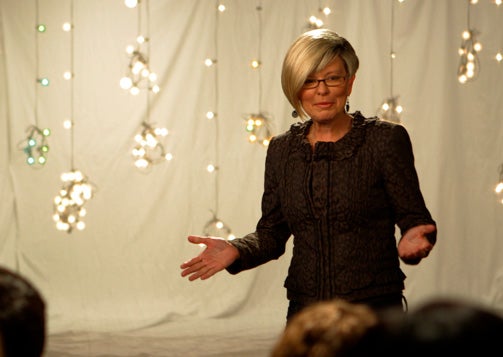|
March 7, 2013
New online curriculum by Stanford's Clayman Institute for Gender Research gives business, enrichment tips
In a series of videos posted online, Stanford professors in sociology and business lecture on negotiation tactics, overcoming stereotypes and how to influence colleagues. The discussions were created with LeanIn.Org, a nonprofit organization founded by Facebook COO Sheryl Sandberg, who is scheduled to speak at Stanford in April. By Brooke Donald

Sociology Professor Shelley Correll lectures on overcoming stereotypes in a video posted online as part of a leadership curriculum for women and men developed by the Clayman Institute for Gender Research. (Photo: Ashley Tindall / Stanford University)
It takes less than 100 milliseconds, or a snap of your fingers, for someone to decide what they think of you.
Telling a story is up to 22 times more memorable than relaying facts and figures alone.
Expectations drive behavior, and research shows that if you change your expectation, you can change your outcome.
These are just some of the lessons tucked into five videos prepared by Stanford's Clayman Institute for Gender Research that are part of a new online curriculum called "Voice & Influence."
The curriculum, which also includes printable discussion guides, is based on a leadership program that Clayman offers women faculty and executives at Stanford.
The online version, launched this week, is designed to give more people access to the lessons, and was produced with LeanIn.Org, a new nonprofit organization founded by Facebook COO Sheryl Sandberg with the goal of encouraging and supporting women in their careers. She will speak at Stanford on April 2.
"With in-person training, we are limited in the number of women we can reach and we are only able to reach women who are already leaders," said Shelley Correll, the director of the Clayman Institute and one of the lecturers. "This new platform will allow us to bring the best educational content to largest number of women possible and at earlier stages in their careers."
So far there are five lessons, with plans to add more as the year goes on. Four of the lectures feature Stanford professors: Correll in sociology and Jennifer Aaker, Deborah Gruenfeld and Margaret Neale of the Graduate School of Business.
The fifth lesson, on team dynamics, is by Melissa Thomas-Hunt, a professor at the University of Virginia's Darden School.
The videos and educational materials are posted on the Clayman Institute's website as well as on the Lean In website. Each video is about 20 minutes long and tackles a different subject: Correll on overcoming stereotypes, Aaker on using stories to advance your ideas, Neale on negotiating to get a good deal and Gruenfeld on gaining power and influence.
The professors cite their own research as well as that of colleagues, giving academic weight to the practical suggestions. The Clayman Institute has, for years, been turning academic studies and research on gender bias and equality into strategies that can be used every day.
While the materials and videos are available to use and watch at any time, they were designed to be incorporated into small group discussions, said Lori Nishiura Mackenzie, associate director at the Clayman Institute.
The partnership with Lean In helps facilitate that integration by bringing women together in real-world peer groups called Lean In Circles, where women can exchange ideas, find support and discuss the topics outlined in the lessons.
"The real challenge is delivering a very personal experience for individual women while harnessing the massive potential of online education," she said.
Mackenzie said one of the challenges when designing the curriculum and making the videos was to make each session accessible and relevant to individuals who may not yet be in a position to create change at their organization.
While the lectures and research focus on women, the strategies can be useful to both men and women looking to advance their careers or become as effective as possible in what they're doing.
"The essential element of a great session is reframing a situation or issue so people feel they can approach their challenges in a new light," she said. "When it happens, we see women trying something new after the session."
Lily Bixler Clausen, co-editor of Gender News at the Clayman Institute for Gender Research, contributed to this report.
-30-
|